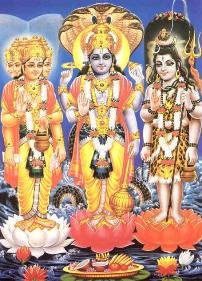Renowned as Bilwa Swarga, the lokas underneath the Seas occupy as much an area as Prithvi; the span of Earth is seventy thousand yojanas, height too is as much. The expanse of Patalas too is as much; these lokas are Atala, Vitala, Nitala, Sutala, Talatala, Rasatala and Patalas and each of these lokas has an expanse of ten thousand yojanas. The colour of these lokas is black, white, yellow, red, grey and golden respectively. The inhabitants of these lokas are Daityas, Danvaas and Nagas. Having visited these lokas, Brahmarshi Narada called these Patalas as Bilwa Swarga and even better than Swarga. These lokas enjoy extreme illumination from the ‘Manis’(diamonds) on the hoods of the Nagas; Narada said: the powerful rays of Surya Deva provide radiance but not heat during the days, while Chandra Deva gives brightness but not too much of coldness. The inhabitant serpents and Daityas revel in themselves with festivities and luxurious delicacies of food, wine and intoxication for long hours of time without concerns and worries. They enjoy good time by way of swims in Sarovaras, rivers and lotus-ponds and deal with all kinds of valuable possessions. Underneath these Lokas shines Bhagavan Vishnu’s ‘Tamoguna Rupa’ as Sesha Naga named as Anantha, worshipped by Siddhas, Devatas, Devarshis and Daityas alike. Lying under the entire Universe, the mighty Sesha Deva bears the brunt of the Prithvi and the ‘Charaachara Jagat’.
Narakaas: Underneath the Paataalas are the Narakas where sinners are thrown into. These Narakas are: Rourava, Shoukara, Rodha, Taana, Vishasana, Mahajjwaala, Tapta kumbha, Mahalobha, Vimohana, Rutiraandha, Vasaatapta, Kurmeesha, Krumibhojana, Asipatravana, Laalaabhaksdhya, Puyavbaha, Vahnijjwala, Adhahshira, Samdamsha, Krishna sutra, tama, Swabhojana, Apratishta, Avichi and so on. All these are under the control of Yama Dharna Raja and these hells are highly frightening as they administer sharp weapons, fire and poison and send shivers in the veins of the targeted sinners. Providing false evidences, speaking with partiality and blatant lies are liable to reach Rourava Naraka. Bhruna Hatya (killing an unborn child while in Garbha), Guru Hatya (killing one’s own Preacher), killing a cow and terminating a person by obstructing breathing would attract ‘Ghora Rourava Naraka’; drunkards, Brahma hatya, stealing gold, and keeping company of such sinners are consigned to Shoukara Naraka. Murdering Kshatriyas and Vyashyas, and killing Rajaduta or Messenger of royalty would attract Tapta kumbha Naraka; selling contraband like hot drinks and intoxicants and deserting ones’ own followers would consign the sinners to Saptaloha Naraka. A person who insults or uses harsh language the Guru or Gurujana, insulting and criticizing Vedas, or selling Vedas and Scriptures, enticing and taking advantage of destitutes, the helpless or the mentally unsound are banished to Shabala Naraka; thieves and those who perform character-assassination of others are destined to Vimoha Naraka; those who display dislike to Devas, Brahmanas and parents are directed to Kumbhibhakshya Naraka; Persons who consume food even before Naivedya to Devas, Pitras and Guests are shunted to Lalabhakshya; those who manufacture arrows and devices to kill are destined to Vedha Naraka, while who produce Khadgas and Ayudhas (swords and weaponry) are sent away to Vishaana; Brahmanas who accept daanaas in connection with evil-oriented tasks, say to appease ‘Kshudra Devatas’ or those who encourage ineligible persons to perform and those who make a profession of misleading astrology to cheat gullible persons go straight to Adhomukha Naraka. Brahmanas by birth practice dealing in the trade of meat, lac, ‘til’ or black sesame seed, salt and intoxicants are sent to Krumipuya; also those Brahmanas in the trade of cats, chicken, goats, dogs, birds and pigs are banished to the same Krumipuya naraka. Such Brahmanas who are in the profession of theater / acting / drama / dance; boating; eat the food of fallen women; carriers of contraband material, accept bribes; maintain cows, buffalos and similar animals to eke livelihood; go to bed with wives especially on Sacred days; put other’s houses on fire and involve in the murders of friends are all diverted to Rudhirandha Naraka. Those human beings who resort to the murder of brothers are thrown into Vaitarini River.
Maharshi Lomaharshana narrated many other sins committed by human beings and the details of the Narakas to which they are consigned to. At the same time, the Maharshi suggested the possible Prayaschittaas (atonements) to mitigate the impact of sins committed by human beings; Swayambhuva Manu and other Great Rishis stated that for bigger sins bigger atonments and smaller indiscretions minor atonements were suggested. All such atonements were of the nature of ‘Tapasya’and the best Tapasya would inded be in the form of memorizing the thoughts of Bhagavan Shri Krishna:
Praayaschittaanya sheshaani Tapah karmaatmakaani vai,
Yaani teshaamaseshaanaam Krishnaanusmaranam param/
krutey Paapaanutaapo vai yasya pumsaha prajaayatey,
Praayaschittham tu tasyaikam Hari samsmaranam param/
Praatarnisha tathaa sandhyaa madhyaanaadishu samsmnaran,
Narayanamavaapnoti sadyah Paapakshayam Narah/
Vishnu samsmaranaat ksheem samasta klesha samchayah,
Muktim prayaati bho vipraa Vishnostasyaarnu keertanaat/
Vaasudevey mano yasya Japa homaarchanaadishu,
Tasyaantaraayo Viprendraa Devendratwaadikam phalam/
(Having committed sins, the best atonements in the form of Tapasya are to recite the name of Shri Krishna always. Those who practice the name in the morning, midday, evening and night would instantaneously secure relief from the sins. Bhagavan Narayana’s ‘smarana’ (memory) and ‘Kirtana’ (singing of Hymns) would facilitate the dilution, gradual relief and access to ‘’Mukti’ finally. The time sent in Japa, Homa, and Archana would indeed be the firm steps to eligibility of Moksha. There could be no better accesses to Swarga and even to Moksha by the unique Mula Mantra of Vaasudeva).

 Prev:Bharata, the Unique Karma Bhumi in Jambudwipa & an outline of other Dwipas
Prev:Bharata, the Unique Karma Bhumi in Jambudwipa & an outline of other Dwipas  Next:Bharata, the Unique Karma Bhumi in Jambudwipa & an outline of other Dwipas
Next:Bharata, the Unique Karma Bhumi in Jambudwipa & an outline of other Dwipas